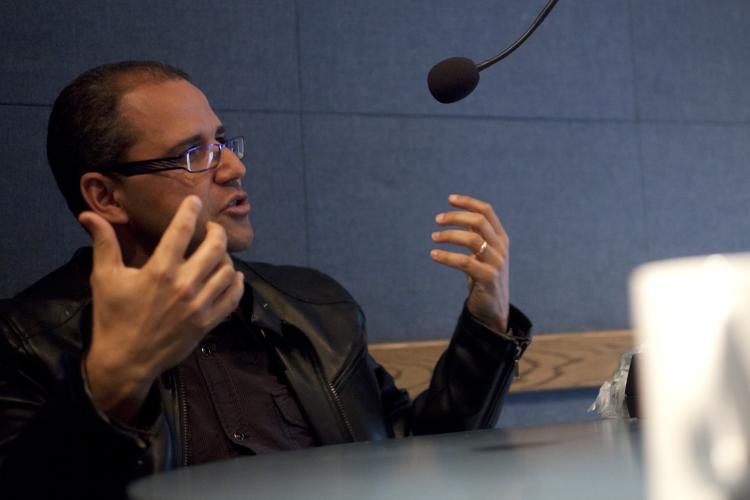Religion in the digital age focus of new research

Professor Nabil Echchaibi on KGNU radio | Photo credit to CMCI
The Henry Luce Foundation has awarded a three-year, $500,000 grant to the Center for Media, Religion and Culture (CMRC) at the University of Colorado Boulder to support an investigation of the changing nature of religious scholarship in the digital age.
The project officially kicks off today, May 18, at the College of Media, Communication and Information (CMCI), where the center is based, with a meeting of prominent international scholars from a variety of fields and disciplines.
“Religion is more and more at the center of contemporary political and social life,” said Stewart Hoover, professor of media studies and director of the CMRC. “This project begins with the fact that religion’s role is increasingly defined by modern media.”
The research effort will bring together scholars, researchers and practitioners in a focused effort to develop new and innovative tools for research, collaboration and communication.
“The center’s global reputation for research focused on religion and spirituality in the media age, combined with the interdisciplinary nature of our college, make this an ideal project to be led by CU,” said CMCI founding dean Lori Bergen. “The profile of religion in the media and in public discussion is growing and our faculty and students are excited for the opportunity to collaborate on developing new tools in this area.”
Alongside their research efforts, the project’s team will develop a new web platform designed specifically for academic collaboration, idea development and multi-platform communication, including digital, print, video and interactive forms.
“It’s not just about the way religion is being made and re-made through modern media, it is also about how we can use digital media as scholars and professionals to transform our work,” said Deborah Whitehead, associate professor in CU Boulder’s Department of Religious Studies and one of the project’s directors.
The working group will also interact with wider networks of academics and practitioners, hosting seminars and workshops on the Boulder campus and at relevant meetings to engage important innovators in journalism, creative arts, digital practice and public education.
“Religions today exist to the extent that they exist in the media,” said Nabil Echchaibi, founding chair of CMCI’s Department of Media Studies and CMRC associate director. “It is simply the case that to understand religions today we have to understand how they are mediated, how they use media and how they are understood through media.”
In addition to Echchaibi, Hoover and Whitehead, the working group includes Sarah Banet-Weiser of the University of Southern California, Anthea Butler of the University of Pennsylvania, Christopher Helland of Dalhousie University, Marwan Kraidy of the University of Pennsylvania, Mirca Madianou of the University of London, Peter Manseau of the Smithsonian Institution, Nathan Schneider of CU Boulder, Jenna Supp-Montgomerie of the University of Iowa and Sara Taylor of Northwestern University.
“Our working group is made up of people who can contribute a great deal through their own research, but who can in turn have influence in the academic world to change the way universities think about and do research on religion,” said Hoover.


